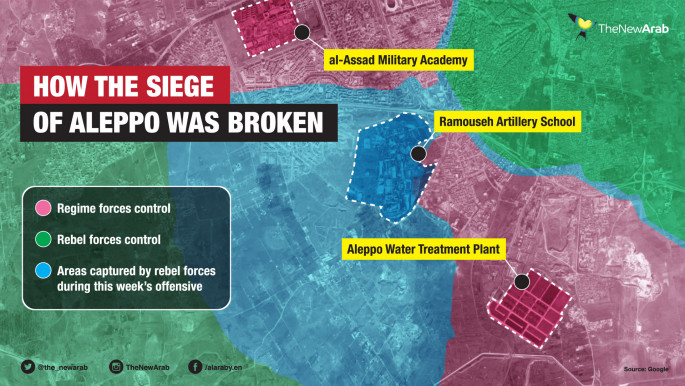UN warns of new siege in Aleppo 'affecting millions'
The international body called for immediate access to the heavily bombed city and urged warring parties to implement a ceasefire.
Ferocious fighting has rocked divided Aleppo in recent weeks, with rebels and regime forces seizing rival access routes and cutting off residents.
The UN's top humanitarian official in Syria, Yacoub El Hillo, and regional coordinator Kevin Kennedy called for a "humanitarian pause" in the hostilities in a statement.
Living in fear
Two million people in the city are living in fear of besiegement, including up to 275,000 people trapped in east Aleppo, the UN said in a statement said.
"The UN stands ready to assist the civilian population of Aleppo, a city now united in its suffering," the statement read.
"At a minimum, the UN requires a full-fledged ceasefire or weekly 48-hour humanitarian pauses to reach the millions of people in need throughout Aleppo and replenish the food and medicine stocks, which are running dangerously low."
Syrian rebels might be wary of implementing a ceasefire given past experiences, particularly in Aleppo.
Bashar al-Assad's forces have repeatedly broken previous cessation of hostilities agreements, which have been implemented after successful rebel offensives.
Regime forces launched a massive offensive in Aleppo earlier this year killing hundreds of civilians.
This was despite a ceasefire being in place, and the fighting derailed negotiations going on at the time between Syria's rival political factions in Switzerland.
Now, with reports that the regime is calling in thousands of reinforcements - including local militias, Hizballah and Iraqi militants - rebels might be wary of pausing the fighting, particularly after recent successes.
Aleppo siege
 |
| [Click to enlarge] |
Fighting in Aleppo flared in late June when regime forces closed in on the Castello Road, the last route into rebel-held parts of the city.
The road was severed in mid-July, sparking food shortages and skyrocketing prices in the eastern districts.
The Assad regime and its Russian ally have restored to siege and starvation tactics in Syria, doing so more openly and on a much larger scale in Aleppo.
Through these sieges, they seek to cut off and isolate rebel-held enclave in the urban belt of Syria under Damascus' control, and starve civilians into submission.
In a major push last week, a coalition of rebels and Islamist fighters cut off the regime's own main access road on the southern edges of the city.
Each side has used their newly acquired territory to bring food and other supplies into neighbourhoods of the city they control, but the roads into eastern Aleppo are still not safe for civilians to use.
"When used to intentionally deprive people of food and other items essential to their survival, siege tactics constitute a war crime," the UN statement said.
The fighting in Aleppo is reported to have killed at least 130 civilians since the end of July, and has damaged hospitals, clinics, and the city's power and water networks.
UN officials in Syria urged for a humanitarian pause to repair Aleppo's damaged water and electricity infrastructure and provide aid to those trapped in the eastern part of the city.
As many as 500,000 have been killed since Syria's conflict erupted in 2011. Millions have been forced to flee, including around five million who have sought refuge in neighbouring countries.
Agencies contributed to this report.





 Follow the Middle East's top stories in English at The New Arab on Google News
Follow the Middle East's top stories in English at The New Arab on Google News
![Israeli forces ordered bombed Gaza's Jabalia, ordering residents to leave [Getty]](/sites/default/files/styles/image_330x185/public/2176418030.jpeg?h=a5f2f23a&itok=_YGZaP1z)

